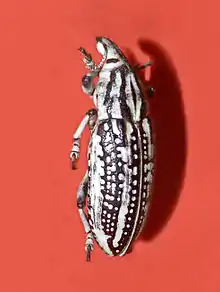Liocleonus clathratus
Liocleonus clathratus is a species of cylindrical weevils belonging to the family Curculionidae.
| Liocleonus clathratus | |
|---|---|
 | |
| Mounted specimen of Liocleonus clathratus | |
| Scientific classification | |
| Kingdom: | |
| Phylum: | |
| Class: | |
| Order: | |
| Suborder: | |
| Infraorder: | |
| Superfamily: | |
| Family: | |
| Subfamily: | |
| Tribe: | Cleonini |
| Genus: | |
| Species: | L. clathratus |
| Binomial name | |
| Liocleonus clathratus (Olivier, 1807) | |
| Synonyms | |
| |
Description
Liocleonus clathratus can reach a length of about 1 centimetre (0.39 in). The body is elongated and the basic coloration is white, with longitudinal black markings on the pronotum and elytrae. These weevils are considered a serious pest. They attacks several Tamarix species, especially Tamarix ramosissima, Tamarix parviflora and Tamarix gallica . Larvae develop in huge galls on the roots and at the base of young rods of the host plants. These gall-maker weevils can be found mainly in April.
Distribution
This species is widespread in the eastern Palearctic realm, in the Near East, and in North Africa.
References
This article is issued from Wikipedia. The text is licensed under Creative Commons - Attribution - Sharealike. Additional terms may apply for the media files.